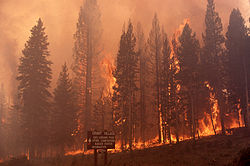Introduction to AND Professor Jerry Johnson's FREE Insight
By: John A. Baden, Ph.D.Posted on June 18, 2018 FREE Insight Topics:
Introduction to Prof. Jerry Johnson’s FREE Insight, John Baden

“Yellowstone’s Predictable Political Problems: From Fires to Firings”
Last week newspapers announced that Yellowstone Park Superintendent Dan Wenk was fired after 33 highly successful years with the Park Service. As MSU professor, Jerry Johnson explains in our next FREE Insights, political forces were the cause. Given Wenk’s excellent record across a wide range of positions, this is a big loss. However, surprise lies only in the details. Here’s why.
Politics is a persistent problem with America’s land management agencies. This is inherent to government ownership of lands that people value. Only the naïve are surprised when political considerations trump good management and science on the federal lands.
In Yellowstone, the world’s first national park, we have seen this pathology with wild fires and firings. Such politically caused problems in the parks and other “romance lands” are sure to increase. One cause will be federal entitlements, mainly Social Security and Medicare, swamping all discretionary federal spending. Little is left for parks and wildlands. Moreover, recall the political mischief of October 2013 when all the national parks were closed for budgetary reasons. Of course, Mount Vernon and Monticello, independent, nonprofit land trusts, remained open.
Let us consider fires. This year is the thirtieth anniversary of the huge Yellowstone Park fires of 1988. These fires resulted from the conjunction of the driest season on record and an obsolete fire prescription, all fires out ASAP. This policy dates from the years when the U. S. Army ran the Park, from 1886 until 1919.
Over the decades, the standard Park Service prescription was to extinguish all fires within 24 hours. This was good public relations; nearly everyone loves Smokey the Bear. However, immediate extinction of fires produced huge accumulations of dead wood. This accumulation grew throughout the Park’s, 80% of which is covered by timber.*
The default policy, put all fires out ASAP, held until “let burn experiments” began in 1972. Superintendent Bob Barbee (Yellowstone Park 1983-94) strongly supported a “let natural fires burn policy”. Because the Park is high and hence has low fungi (elevations range from a low of one to two miles high), dry (20” annual precipitation), and cold (average temperature is 32.2 ºF), wood rots extremely slowly. Hence, fuel loads build. Lightening caused fires were usually small and produced pocket cleared of fuel.
However, 1988 was an abnormally dry and hot summer. Extreme heat and dry conditions combined with high fuel loads led to the fires of ’88. Despite the deployment of over 10,000 fire fighters, the fires burned about 43% of the Park’s area.
Shortly after autumn snows extinguished the fires, the Wall Street Journal asked George Hertzog, former director of the National Park Service, and me to write companion Editorial Page columns on how to protect our national parks, America’s “romance lands”. (WSJ, Wed. Nov. 23, 1988)
The Journal’s editors titled our essays “Take Politics Out of the National Parks”. Our suggestions were different but complementary. I proposed transferring our national parks to independent not-for-profit land trusts. The Audubon Society and Nature Conservancy lands were models I mentioned. Today the American Prairie Reserve, one and a half times the area of Yellowstone Park, is a recent highly successful creation. It could serve as a model. Why is this important?
It is exceedingly difficult, likely impossible, to insulate federally owned lands from political influence. Political expediency trumps ecological sustainability. In the latest example, Interior Zinke dismissed Yellowstone National Park Superintendent Dan Wenk earlier this month (June 2018).
He can visit Yellowstone, but only as a tourist. Despite his decades of success, Wenk will not be allowed to serve as Superintendent during the transition. In the following essay MSU professor, Jerry Johnson describes this sorry situation and suggests a new position for Superintendent Wenk.
The fundamental problem of course remains: Federal land management is hostage to political interferences. There is no perfect system for managing America’s romance lands and most environmentalists remain wedded to the ideal of government ownership, management, and control. For national parks, this usually works quite well. However as the Yellowstone Park fires of 1988 and Dan Wenk's firing of 2018 demonstrate, problems of political influence will occur under government ownership.
However, we have centuries experience with public trusts. These operate for managing hospitals, schools, lands, and many other public purposes. I find them an increasingly attractive alternative to government ownership, management, and control of America’s romance lands. I expect to see an evolution, first toward cooperation with trusts and then a gradual transfer of ownership. Professor Johnson’s discussion indicates one reason why conservationists may find this attractive.
A Promising Future for YNP’s former Superintendent Dan Wenk
A Proposal by Professor Jerry Johnson, MSU
Americans respect Interior Secretary Ryan Zinke’s work as a Navy SEAL. He was a SEAL from from 1986 until 2008, retiring with commander rank. In 2015, he was elected as Montana’s single congressman, the first SEAL to serve in Congress. In 2017, Pres. Donald Trump appointed him Sect. of Interior.
Secretary Zinke advocates opening up public lands for mining and resource development. Turkewitz, Julie (2018-04-16). "Ryan Zinke Is Opening Up Public Lands. Just Not at Home". The New York Times. ISSN 0362-4331. Retrieved 2018-04-17.
This is despite strong public support for maintaining or expanding national monuments and wildlife refuges, roughly 70+%. His narrow view of economic progress seems blind to the strong evidence that intact parks, wildlands, mountains, and wild waters, America’s “romance lands”, are strong draws for people with high human capital. These are now the drivers of economic progress and vibrant communities.
He has consistently made a series of decisions that go against the conservation goals his agency has embodied during recent decades. Now, through his political appointments of hatchet men (and women), Zinke demonstrates lapdog behavior toward Trump. This has hit very close to our home territory. On June 7, 2018, Zinke dismissed Yellowstone National Park superintendent Dan Wenk. He was told to hit the road.

He can visit Yellowstone, but only as a tourist. Wenk cannot serve as Superintendent during the transition. What a loss. What a travesty. (Todd Wilkinson has written an outstanding piece on the whole sordid affair at Mountain Journal (http://mountainjournal.org/chief-of-yellowstone-forced-out).)
I know Dan Wenk, I like him, and I admire his management of America’s first national park. He is an honorable man. It is a difficult job made all the harder by political hacks like Zinke and special interest park clientele. Is it true one of the reasons he was not allowed to finish out his career in Yellowstone is that his bison management plan angered the Montana ranching community. In their willful ignorance, and Zinke’s, they managed to end yet another career of a good man working for the public’s good.
The vast majority of Americans support Department of Interior actions like the creation of national monuments, maintenance and preservation of our country’s crown jewels – the system of 58 national parks, and full funding of the Land and Water Conservation Fund. Americans love their public lands especially the romance lands of the American West – Zion, Arches, Grand Canyon, Yosemite, and especially Yellowstone.
Those who oppose those actions and prefer seeing our public lands commercialized, sold off, or developed are a small, highly concentrated group. As economics Mancur Olson explained in his classic Logic of Collective action, in the political arena concentrated interests normally trump much larger but highly diffused groups.
Zinke, and those who support his positions would benefit from understanding the economic force of amenity economies vs. commodity economies. The key: amenity economies are doing better by a factor of 10. Not one of the burgeoning crowds of people moving to Bozeman, Jackson, or Pinedale are looking to mine gold or drill for oil. They bring prosperity and high social capital.
Over the medium and long term, these qualities make us better off and build wholesome communities. Only the most naïve and short sighted expect this pleasant outcome in a town or city built on extractive industries. Only when the extractive industry is long gone and the romance potential of the place emerges can it bloom. Park City, Utah is but one of many examples.
This cloud has a silvery lining. Zinke has failed as a steward of our public lands. Further, he clearly has been disrespectful and vengeful in his treatment of Superintendent Wenk. Dan Wenk is revered for protecting America’s romance lands. Educated, well off Americans in particular increasingly value and want to conserve these lands. This creates an opportunity for us locals—and for visitors who return annually until they ultimately land here.
Montana State University has the copy right on “The University of the Yellowstone”***“There’s something about our environment that inspires big ideas and bold adventures. Strong academics, real-world research and creative projects and the energy of a Rocky Mountain community define Montana State and those who study, live and play here.”
Here is an idea, MSU could help rectify this unfortunate situation. Strike while the iron is hot and immediately raise funds for an endowed professorship, a chair in Society, Prosperity, and Resource Management. Endow the chair and entice Dan to continue his good work by teaching and speaking. He could share his 40 years experience of managing natural resources at MSU.
If asked by President Waded Cruzado, wealthy supporters of the national park ideal would step up. This would be a most fitting component of MSU’s 125 Anniversary Celebration.
*f. n. In the 1970s I logged Forest Service timber sales in the Gallatin National Forest bordering the Park on the North. The Forest Service estimated that some of this land had roughly 100 tons of standing dead or dead and down timber per acre. (An acre is about the size of a football field not counting the end zones.) This is a substantial fuel load.
**f. n. While Dr. Geoff Gamble was MSU President, Prof. Jerry Johnson was head of Political Science, and John Baden was on MSU’s President’s Advisory Council. John and Jerry proposed that MSU be “The University of the Yellowstone”. Pres. Gamble applied for and received this copy right:
***f.n. "The University of the Yellowstone" "At MSU, our aspirations are as grand as our horizons."

